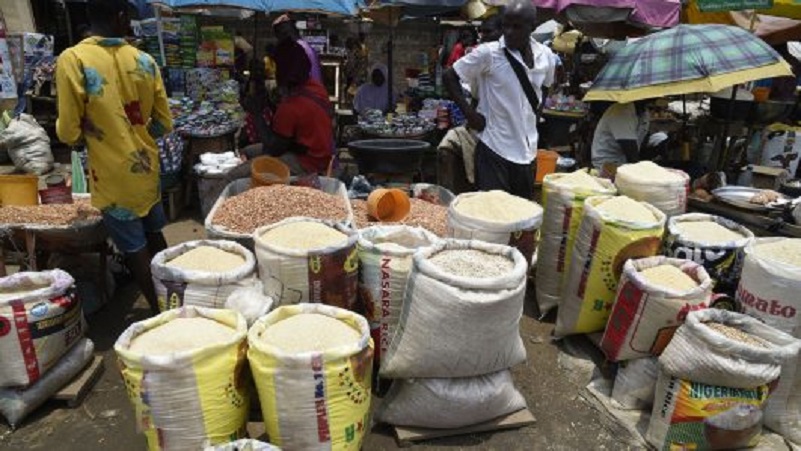Economy
Nigeria’s Wheat Value Chain’s Growing Importance to Job Creation, Food Security

The wheat value chain continues to play key roles in providing employments for the active segment of the population while strengthening the nation’s food security position.
The jobs and the affordable meals that are being delivered to the local markets through the bold developmental actions pursued by the local wheat millers couldn’t have come at a better time as Nigeria’s unemployment situation and inflationary trends grow agonizingly worse.
Data released by the National Bureau of Statistics (NBS) indicates that unemployment, underemployment and youth unemployment/ underemployment, reached 33.3 %, 22.8 %, 42.5% respectively in the 4th quarter of 2020 in the country.
Meanwhile, the increasing dietary shift to more affordable wheat derivative foods such as bread, semolina, pasta and noodles has led to expanded production, processing, warehousing, distribution/ logistics, fleet management, last-mile and retailing activities in the wheat value chain, consequently lifting the employment generating capacity of the value chain from 10 million to 12 million.
Coming at such a crucial time when the impact of the COVID-19 pandemic incessantly weakens the economic contributory latency of other sectors, the robust activities being generated along the wheat value chain are a rare lift for Nigerian households.
The wheat value chain does not only provide jobs for the population, it also ensures the population has consistent access to affordable quality foods.
In the past year, the prices of Rice, Garri, millet and Beans, which are notable national staples, have risen sharply by 21.1%, 114.1%, 57.2% and 66.6%, respectively, while the prices of wheat derivative foods have been largely cushioned from the adverse inflationary trend by local millers.
The flour milling companies, under the aegis of the Flour Milling Association of Nigeria (FMAN), and the bakers, intentionally absorb the extra cost of production occasioned by the tough operating environment, in order to keep feeding the population.
Take for instance bread, a widely consumed staple food produced from wheat. The wheat millers continue to ensure that while other food commodities increased in price by 50% and more in the past year, bread is shielded from such debilitating trend, increasing by just 28.5% and the average daily production output of 10 million loaves is maintained. To this end, bread has traditionally become the cheapest carbohydrate option available for Nigerians.
The availability of quality flour brands at competitive prices helps the bakers to maintain production level, forgo downsizing and help meet customers demands, despite the adverse effects of the COVID-19 outbreak. Bakers, therefore, understand the importance of the millers’ intervention efforts.
How did the flour millers achieve such an important economic balancing act? The flour millers intentionally track commodity prices in the carbohydrate food staple space to keep the price of inputs for bread production competitive. The same goes for every other wheat derivative food such as semolina, noodles and pasta, which the flour millers intentionally ensure are kept within affordable price boundaries of the consumers.
A global consulting firm, KPMG, attests to the important roles played by flour millers in feeding a national population that has over the years been priced out of the other staple foods due to continuous food price inflation, a spike in unemployment rate and a declining income level.
In a report themed ‘Wheat-based consumer foods in Nigeria’, KPMG underscored the fact that the flour milling businesses that operate in Nigeria have been a source of “low-cost convenient staple and baked foods” for the teeming population.
This also explains why 45% of the food variants served in Nigerian homes are produced from wheat. As more foods are being served to nourish, sustain and strengthen the Nigerian populace, by direct correlation, more jobs are also being created by the wheat millers and the wheat value chain.
Speaking on the employment-generating and food security roles played by the wheat value chain, Mr Ashish Pande, Managing Director of Crown Flour Mill (CFM) Limited, a subsidiary of Olam, an agribusiness conglomerate, said: “Presently, the wheat value chain accounts for over 10.5 million jobs generated annually in Nigeria. This of course has placed the wheat value chain at the centre of the various economic development agenda of the Federal Government of Nigeria.”
To reiterate the nutritional and economic contributions of flour millers, Ashish expatiated further, “Presently, the wheat value chain adds N2.3 trillion to Nigeria’s GDP annually, being the average yearly spend on wheat derivative foodstuffs; and accounts for 75 million of the daily food portions in Nigerian households.”
He said, “To scale up its contributions, the milling association continues to invest N500 million annually in seed trials, research, training of smallholder wheat farmers and reimbursing the various farming research institutes in the country to ensure that the current local production levels of wheat improve significantly. While these efforts have ensured that we keep providing affordable and quality food for the growing Nigeria population, it has also deepened the rate of jobs generated for the young and active of the population.”
Similarly, Professor Adetunji Kehinde, provost of the College of Agriculture, University of Osun, provided an insight into the robust activities that keep turning out the impressive job creation rates in the wheat value chain.
He said, “Like other agro-products, the wheat value chain has created and is still creating employment at the pre-production (procurement of loan for land, labour, and training), production (seed procurement to field management till harvesting time), harvest (methods, tools, labour, and transport) and postharvest (handling, storage, processing, and milling), preservation, packaging, distribution and marketing levels. The wheat milling industry is one of the most important drivers of employment in the food sector.”
Considering the contributory role that the wheat value chain plays in employment generation and food security, all hands must be on deck to support flour millers, in their current efforts to strengthen the all-important value chain.
Formulating and implementing a developmental agro and financing policy framework that would ensure that flour millers continue to access wheat would help maintain the key roles of providing affordable staple foods and employment for the Nigerian population. This should be the focus of the Federal Government and relevant agencies and key stakeholders, especially at this challenging period.
Economy
Champion Breweries Concludes Bullet Brand Portfolio Acquisition

By Aduragbemi Omiyale
The acquisition of the Bullet brand portfolio from Sun Mark has been completed by Champion Breweries Plc, a statement from the company confirms.
This marks a transformative milestone in the organisation’s strategic expansion into a diversified, pan-African beverage platform.
With this development, Champion Breweries now owns the Bullet brand assets, trademarks, formulations, and commercial rights globally through an asset carve-out structure.
The assets are held in a newly incorporated entity in the Netherlands, in which Champion Breweries holds a majority interest, while Vinar N.V., the majority shareholder of Sun Mark, retains a minority stake.
Bullet products are currently distributed in 14 African markets, positioning Champion Breweries to scale beyond Nigeria in the high-growth ready-to-drink (RTD) alcoholic and energy drink segments.
This expansion significantly broadens the brewer’s addressable market and strengthens its revenue base with an established, profitable portfolio that already enjoys strong brand recognition and consumer loyalty across multiple markets.
“The successful completion of our public equity raises, together with the formal close of the Bullet acquisition, marks a defining moment for Champion Breweries.
“The support we received from both existing shareholders and new investors reflects strong confidence in our long-term strategy to build a diversified, high-growth beverage platform with pan-African scale.
“Our focus now is on disciplined execution, integration, and delivering sustained value across markets,” the chairman of Champion Breweries, Mr Imo-Abasi Jacob, stated.
Through this transaction, Champion Breweries is expected to achieve enhanced foreign exchange earnings, expanded distribution leverage across African markets, integrated supply chain efficiencies, portfolio diversification into high‑growth consumer beverage categories, and strengthened presence in the RTD and energy drink segments.
The acquisition accelerates Champion Breweries’ transition from a regional brewing business to a multi-category consumer platform with continental reach.
Bullet Black is Nigeria’s leading ready-to-drink alcoholic beverage, while Bullet Blue has built a strong presence in the energy drink category across several African markets.
Economy
M-KOPA Nigeria Plans Expansion to Edo, Others After N231bn Credit Milestone

By Adedapo Adesanya
Emerging market fintech firm, M-KOPA, has announced plans to deepen its reach in Nigeria to the South South and South East regions, starting with Edo this year, after providing N231 billion in credit to over 1 million customers in the country.
The firm released its first Nigeria-focused Impact Report, which showed that Nigeria is M-KOPA’s fastest-growing market and fastest to reach the milestone.
Since its foray into the Nigerian market in 2019, M-KOPA has been working to dismantle barriers to financial inclusion by providing flexible smartphone financing and digital financial tools that align with how people in the informal economy earn and manage their money.
It operates in six states in the country, including Lagos, Ogun, and Oyo, among others.
The report highlights the company’s contribution to income generation, digital inclusion and economic opportunity for Every Day Earners across the country.
The report showed that M-KOPA has enabled 290,000 first-time smartphone users, while 56 per cent of agents accessed their first income opportunity through the platform.
It showed high income and livelihood gains among its users, with about 77 per cent of customers leveraging smartphones or digital loans obtained through the platform to generate income, indicating that access to financed devices is directly supporting micro-entrepreneurial activity and informal sector productivity.
Furthermore, 75 per cent of users report higher earnings since gaining access to M-KOPA’s services, suggesting measurable improvements in personal revenue streams. On the distribution side, 99 per cent of agents disclose increased earnings, reflecting positive spillover effects across the company’s value chain.
In addition, 81 per cent of long-term customers state that their household expenses have improved, pointing to enhanced financial stability and better consumption smoothing over time.
Speaking on the report, Mr Babajide Duroshola, General Manager, M-KOPA Nigeria, said, “Nigeria represents extraordinary potential, and we’re proud that it has become M-KOPA’s fastest-growing market. Our Impact Report shows that when Every Day Earners gain access to the right digital and financial tools, they use them to create stability and long-term progress for their families. This is about access that unlocks opportunity and sustained prosperity.”
On its expansion plans Nigeria-wide, the M-KOPA helmsman said, “Many of the states we are considering are already similar to the ones we are currently in proximity… So, there is proximity and similarity between these states, and that’s what we are going to do, starting with Edo.”
He noted that as M-KOPA Nigeria continues to expand, the focus remains on ensuring more everyday earners gain access to the digital and financial tools they need to build resilient, prosperous futures in Nigeria’s rapidly digitising economy.
Economy
Tinubu Okays Extension of Ban on Raw Shea Nut Export by One Year

By Aduragbemi Omiyale
The ban on the export of raw shea nuts from Nigeria has been extended by one year by President Bola Tinubu.
A statement from the Special Adviser to the President on Information and Strategy, Mr Bayo Onanuga, on Wednesday disclosed that the ban is now till February 25, 2027.
It was emphasised that this decision underscores the administration’s commitment to advancing industrial development, strengthening domestic value addition, and supporting the objectives of the Renewed Hope Agenda.
The ban aims to deepen processing capacity within Nigeria, enhance livelihoods in shea-producing communities, and promote the growth of Nigerian exports anchored on value-added products, the statement noted.
To further these objectives, President Tinubu has authorised the two Ministers of the Federal Ministry of Industry, Trade and Investment, and the Presidential Food Security Coordination Unit (PFSCU), to coordinate the implementation of a unified, evidence-based national framework that aligns industrialisation, trade, and investment priorities across the shea nut value chain.
He also approved the adoption of an export framework established by the Nigerian Commodity Exchange (NCX) and the withdrawal of all waivers allowing the direct export of raw shea nuts.
The President directed that any excess supply of raw shea nuts should be exported exclusively through the NCX framework, in accordance with the approved guidelines.
Additionally, he directed the Federal Ministry of Finance to provide access to a dedicated NESS Support Window to enable the Federal Ministry of Industry, Trade and Investment to pilot a Livelihood Finance Mechanism to strengthen production and processing capacity.
Shea nuts, the oil-rich fruits from the shea tree common in the Savanna belt of Nigeria, are the raw material for shea butter, renowned for its moisturising, anti-inflammatory, and antioxidant properties. The extracted butter is a principal ingredient in cosmetics for skin and hair, as well as in edible cooking oil. The Federal Government encourages processing shea nuts into butter locally, as butter fetches between 10 and 20 times the price of the raw nuts.
The federal government said it remains committed to policies that promote inclusive growth, local manufacturing and position Nigeria as a competitive participant in global agricultural value chains.
-

 Feature/OPED6 years ago
Feature/OPED6 years agoDavos was Different this year
-
Travel/Tourism10 years ago
Lagos Seals Western Lodge Hotel In Ikorodu
-

 Showbiz3 years ago
Showbiz3 years agoEstranged Lover Releases Videos of Empress Njamah Bathing
-

 Banking8 years ago
Banking8 years agoSort Codes of GTBank Branches in Nigeria
-

 Economy3 years ago
Economy3 years agoSubsidy Removal: CNG at N130 Per Litre Cheaper Than Petrol—IPMAN
-

 Banking3 years ago
Banking3 years agoSort Codes of UBA Branches in Nigeria
-

 Banking3 years ago
Banking3 years agoFirst Bank Announces Planned Downtime
-

 Sports3 years ago
Sports3 years agoHighest Paid Nigerian Footballer – How Much Do Nigerian Footballers Earn


















